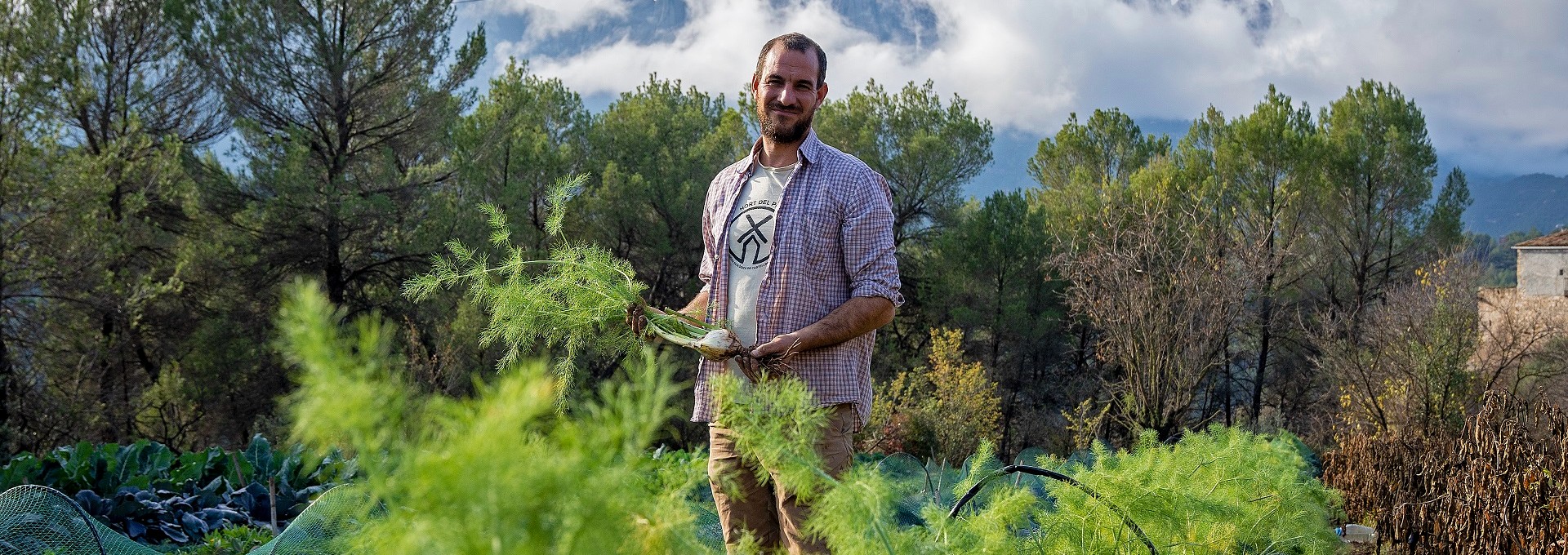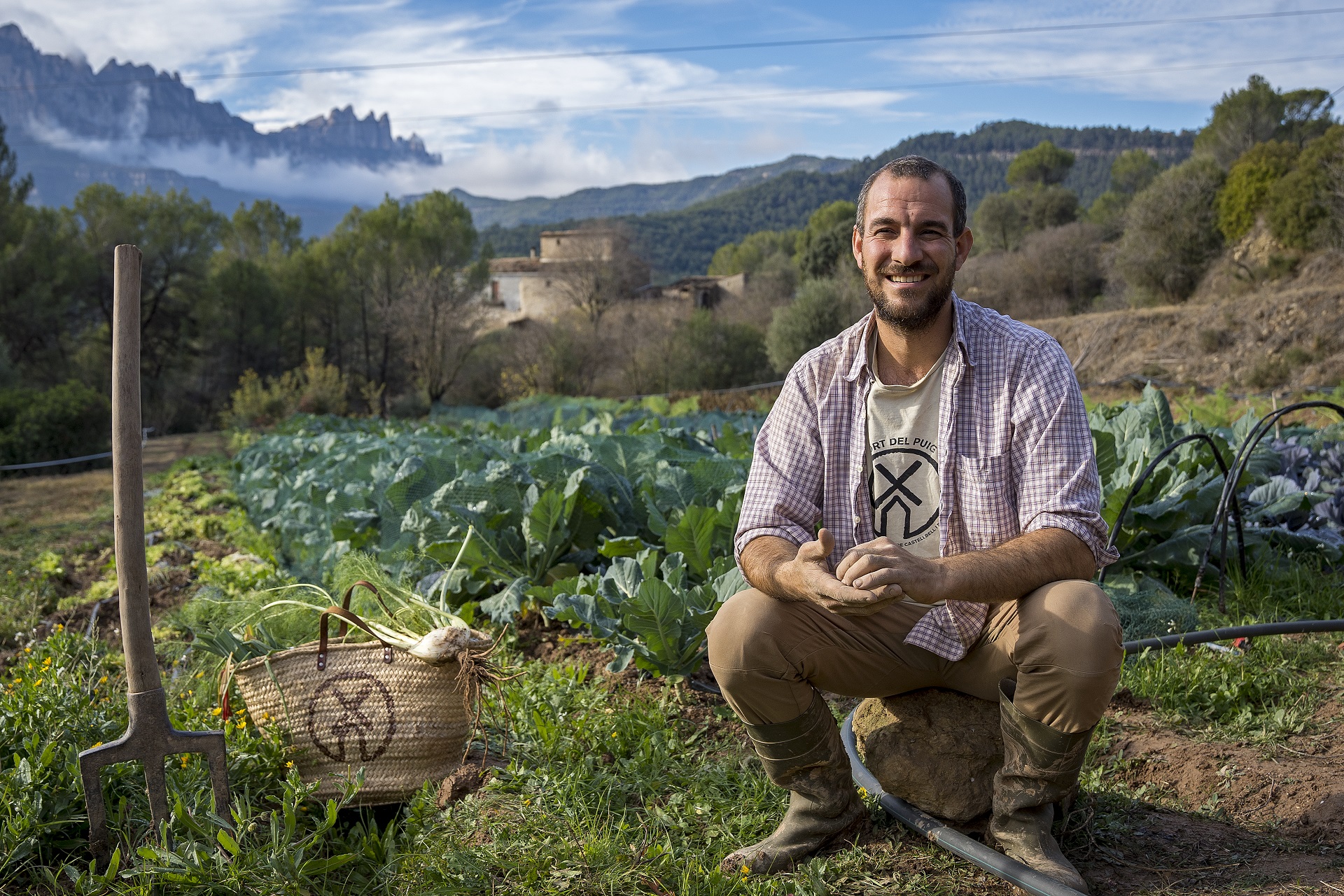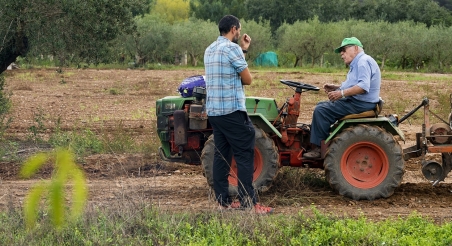Nil Puig takes pride in showing us around his market garden. Ten years ago, this determined Manresa-born 36-year-old decided to undertake a farming project on land owned by his family on the Mas del Puig farm. The land was no longer being professionally farmed but Nil had a clear vision: he was going to set up an organic market garden and his products would be certified by the Catalan Council for Organic Agricultural Production (CCPAE). It’s a real pleasure to visit Hort del Puig today, strolling among its impressive rows of calçots (a Catalan variety of green onion) and leeks, observing the dew on its cabbages, and enjoying the birdsong, not to mention the views of Montserrat, the multi-peaked mountain range.
Nil and two workers produce enough in the three-hectare market garden to supply around ninety baskets that they distribute weekly to consumer groups and shops, both within Montserrat Rural Park itself and in the counties of Bages and Vallès Occidental. But Nil’s job is no walk in the park: for two years he’s had to contend with raids on his crops by wild boars and roe deer. Given the magnitude of the damage, Nil calls for structural solutions that will allow him to protect his crops. Although his heart belongs to Manresa, he’s lived all his life in the family home in Castellbell i el Vilar that he now shares with his partner and their three children, along with four other families.
Nil, you studied biology. So when exactly did you decide to undertake the Hort del Puig project?
I started getting things ready in 2012. I’d previously volunteered on farms around the world through the Worldwide Opportunities on Organic Farms (WWOOF) organisation. So I’d travelled a lot and been involved in several projects, but it wasn’t until after I’d returned that I decided to undertake my own project in Castellbell i el Vilar. Given that there was land available to me here, I thought it’d be an easier and more practical option than leasing land elsewhere.
There’s a windmill on the company logo. Why did you choose this symbol?
It’s a windmill located down from the market garden, on the land where we started out. My brother’s an artist and he designed the company’s corporate image.
How did you come to set up the business on this land? Is it yours?
An uncle of mine owns the estate. Some fifteen years ago, he took over the farmhouse, which was falling into disrepair – only my parents lived there – and built some dwellings here to be used by families or tourists. Over time, the rural tourism business closed and now the place is home to five families and two other people. This is the uncle who gave me every facility to recover some cropland that hadn’t been farmed for thirty years.
How did you find out about Montserrat Rural Park?
Through some information sessions that were organised when the rural park initiative was launched. Everyone who works in the local agricultural sector was invited to come along to hear about what it involved. Although the estate is located in the park, my life has always revolved around Manresa. That’s where my heart really belongs: nursery school, higher education... I’ve always done everything there. Here is where I lived, but Manresa was my activity hub until I started working in Castellbell in 2012. Even now, I still feel like a Manresa local, because my group of friends and social network are based there, but I live here with my partner, who’s a vet. We’ve got three children: a five-year-old, a three-year-old and a baby who’s just eight months old.
And when did you first hear about the Land Bank of Montserrat Rural Park Land?
A group of technicians from Barcelona Provincial Council visited us here at Hort del Puig. One of them was Pere Navarro, the technician in charge of the Land Banks Network – part of the BCN Smart Rural strategy – and I began to find out about some of the projects they’ve implemented, such as the business incubator initiative and the land banks. Since then, I’ve coincided with Pere, who also lives in the Bages area, at various events. We both took part in a recent round table discussion on generational renewal.
Do you think that initiatives such as the land bank are useful for boosting the primary sector?
I’ve come here to work land belonging to the family, so I haven’t been affected by the land issue. Having said that, I must admit I’ve realised over time that this patch of land isn’t ideal for growing vegetables. It gets a lot of shade and is composed of narrow terraces, which complicates irrigation, cultivation, mechanisation processes, etc. Everything’s more difficult. It’s labour-intensive land, which is why it wasn’t previously used for vegetable growing: only the part reached by the stream was devoted to market gardening, while the rest of it was used for dryland farming: vineyards, olive groves, almond groves, crops such as alfalfa and chickpeas, etc. Sometimes I think it would have been easier to have started somewhere flatter and more efficient. If I ever decided to farm on a flatter site, I’d go and ask the land bank. It would be a useful resource for me!
«If I ever decided to farm on a flatter site, I’d go and ask the land bank. It would be a useful resource for me!» Nil Puig
Would you recommend the land bank to other young people who want to undertake agricultural projects?
Yes, I think it should be their first port of call for enquiring about getting access to land. In fact, in the discussion on generational renewal that I mentioned before, we highlighted the importance of the land bank in helping landowners to make farmland available that isn’t being worked. The spot where we are now, for example, belongs to the Genovès farm, not the Puig farm. I realised that in order to make things run more smoothly, I needed a little sun and water, so I took advantage of this land that wasn’t being used. If these deals are done through a body that mediates between the person who owns the land and the person wishing to work it, the process becomes much easier.
So tell us a bit about the day-to-day running of the Hort del Puig ecological market garden. What task do you enjoy the most?
I love thinking about how to improve the business. I initially undertook the Hort del Puig project because I enjoy working the land, planting and selling. «How lovely!», I thought to myself, and then I ended up running a company. This means that, in addition to working in the market garden, I run our social networks, I deal with customers, I manage human resources, organisational aspects and volunteering. I answer calls, I design the communication and advertising strategy, I do deliveries, etc. I’ve ended up dealing with all these aspects and I’ve realised that I like the broad scope of the work. For instance, I find it satisfying if I’ve managed to do well one year because I’ve been quick to take advantage of some financial incentives that have been made available to foster the hiring of personnel. If there’s a shortage of some kind, I think about processes to overcome it. In fact, although I studied biology, if I were to go back to university I might opt for a degree in agronomy or business administration. That said, having the chance to do some strimming or weeding is a real luxury for me, since I’m usually too busy with management stuff.
«Having the chance to do some strimming or weeding is a real luxury for me» Nil Puig
What does being in contact with the land teach you?
The Hort del Puig project has made me search for knowledge I didn’t have... Basically everything, I didn’t know much about market gardening! In biology you study plants, but not the land. The farm has made me enter a cycle of continuous training, covering a broad range of aspects. At the end of the day, the project grows with the person and the person with the project.
As a young farmer, what are the main challenges you have to deal with?
Farming work is tough and unstable. An agricultural project has tight profit margins, the pay is poor and the work isn’t recognised. It might seem like we’re complaining for the sake of it, but that’s not true: what I’m calling for is a farming sector that can offer decent working conditions; in other words, a forty-hour working week with holidays. An agricultural project has to be viable under these conditions rather than having to work seven days a week, which people see as normal. We have to demand this change. The primary sector needs to be properly recognised! What’s more, it’s an unpredictable profession: not only do we have to deal with hailstorms and frost, but also the proliferation of wild boar and hunting fauna, such as the roe deer, which was reintroduced here two years ago and has been making its presence felt strongly. This has increased the cost of protecting the market garden and entails many hours of work, which makes crop farming far less efficient.
«The primary sector must be properly recognised!» Nil Puig
How is production affected by the damage caused by animals?
We usually lose half of the harvest, but in some cases the entire crop can be damaged. We haven’t been able to harvest lettuce for two years! Wild boars destroy everything in a single raid, but roe deer do their eating little by little without you realising it, leaving you with small, nibbled crops. It’s a massive issue, which is why we need help from public bodies. You get the impression that it’s not seen as a real problem, but it’s extremely serious. As I see it, it’s the issue most likely to put all our farms out of business! When you explain the damage caused by wildlife, people tell you it’s down to hunters to solve the problem because farms are private areas. What I say is that a huge issue like this can’t possibly be solved by hobbyists. So it’s an uncertain profession, because although you always put in the same amount of work, you don’t know if you’ll be able to sell anything and therefore collect a salary. Maybe that’s why when I’m teaching at the Manresa Agricultural School, I feel great peace of mind knowing that it’s a paid job.
Over the time you’ve been running the market garden, have you received financial assistance from public bodies?
I received start-up funding for new young farmers. However, the requirements are extremely demanding, since you have to maintain the activity for at least five years. On the one hand, it makes sense because when you’re starting out, you have every intention of keeping your business going for five years or more, but on the other hand the requirement doesn’t take into account the fact that projects sometimes aren’t viable or involve aspects that don’t only depend on the work that you do. This requirement is leading lots of people to get their fingers burned with a funding scheme that looks very appealing.
Your parents didn’t live off the land. Where do your farming roots lie?
My grandparents did live off the land. Mas del Puig was a really important farm in Castellbell i el Vilar and the local area. They had an oil mill, workers living on site, a threshing floor, a tractor that they shared with other local farms... The problem is that my grandparents both died very young, at just fifty years old, leaving behind six orphaned children seven years apart: my father and five brothers, all of whom upped sticks. They survived thanks to the land owned by the family, but the farm was no longer professionally productive. After some years, my uncle started growing potatoes there. My dad set up a small vegetable garden, but because he was also into mountain climbing, vegetable growing was an intermittent activity. When my brother was born, in 1990, my father abandoned his vegetable garden project, because what with looking after two sons and the mountain climbing, he couldn’t continue with it.
With Hort del Puig it’s lovely seeing my parents reconnecting with the land now that they’ve retired. They come to volunteer at the farm and we all have breakfast downstairs together... My grandparents’ death had never really been talked about at home, but when I started working here, I met people who’d known my granddad. Talking to people who’d known him gave me the chance to bring up the subject at home, as a sort of family therapy, and little by little, things started to come out. One of my cousins, Magda Puig, is an artist. She’s done some research on our grandma and written a play called "Me & Magdalena".
Would you like your children to keep the company going?
I’ve been asked this question before and my answer has always been the same: running a farm is tough, both the cultivation side and the business side. But lately my outlook has started to change and I’m trying to approach the job as best I can. Now that Hort del Puig is all set up and the foundations are in place, I want to see the positive side of the project. What’s more, we took on a new worker in September who’s brought some much-needed enthusiasm and energy to the project. Meanwhile, teaching at the agricultural school has also helped me to adopt a more optimistic outlook. It’s lovely for my kids to live in a place like this and although I sometimes feel that maybe they could save themselves the headache of running a business, later I think it over and realise that there’s a solution to every problem.
— BCN Smart Rural Editorial —




